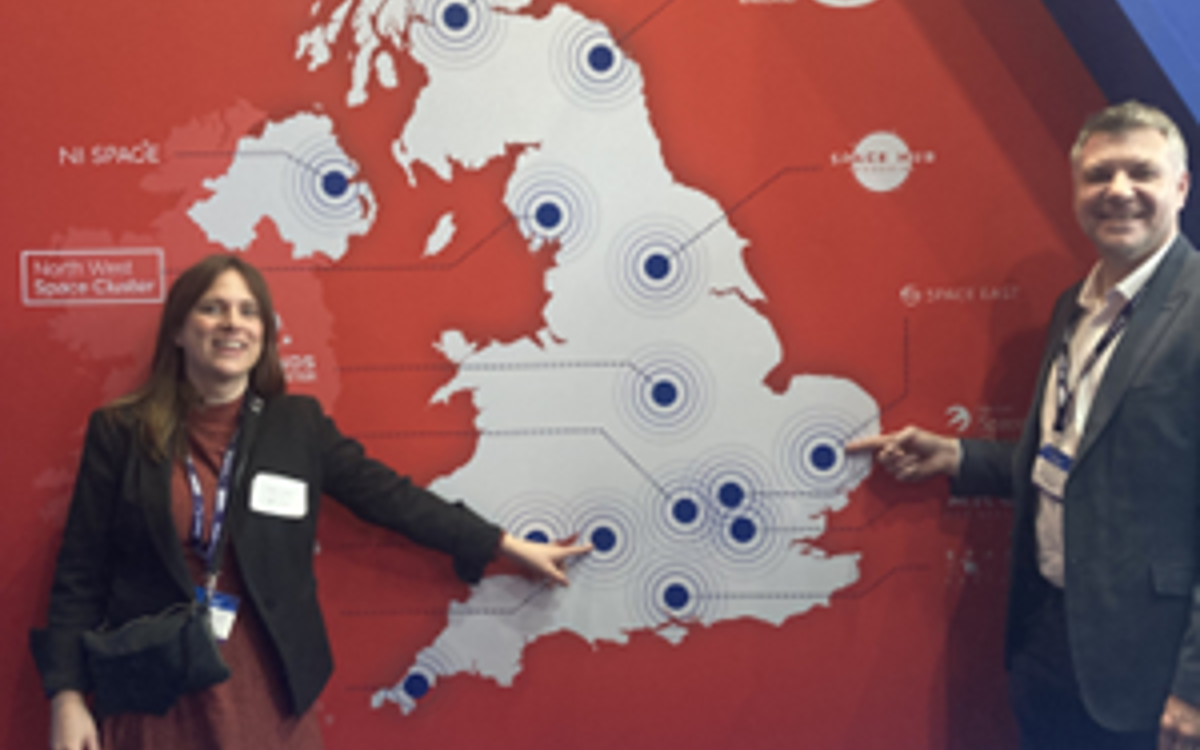
Space West - June Newsletter
News from the cluster
Welcome to the June edition of our Space West Newsletter. With each newsletter, we aim to share the most recent discoveries, advancements, and stories from the world of Space in the South West.
About Space West
Space West is a regional consortium of academic and industry partners designed to accelerate growth and innovation in the space sector within the region and nationally. The Space West programme is hosted by the National Composites Centre, in partnership with West of England Combined Authority, the Centre for Modelling and Simulation, the University of Bath, the University of Bristol and the University of the West of England.
Space West Regional Map
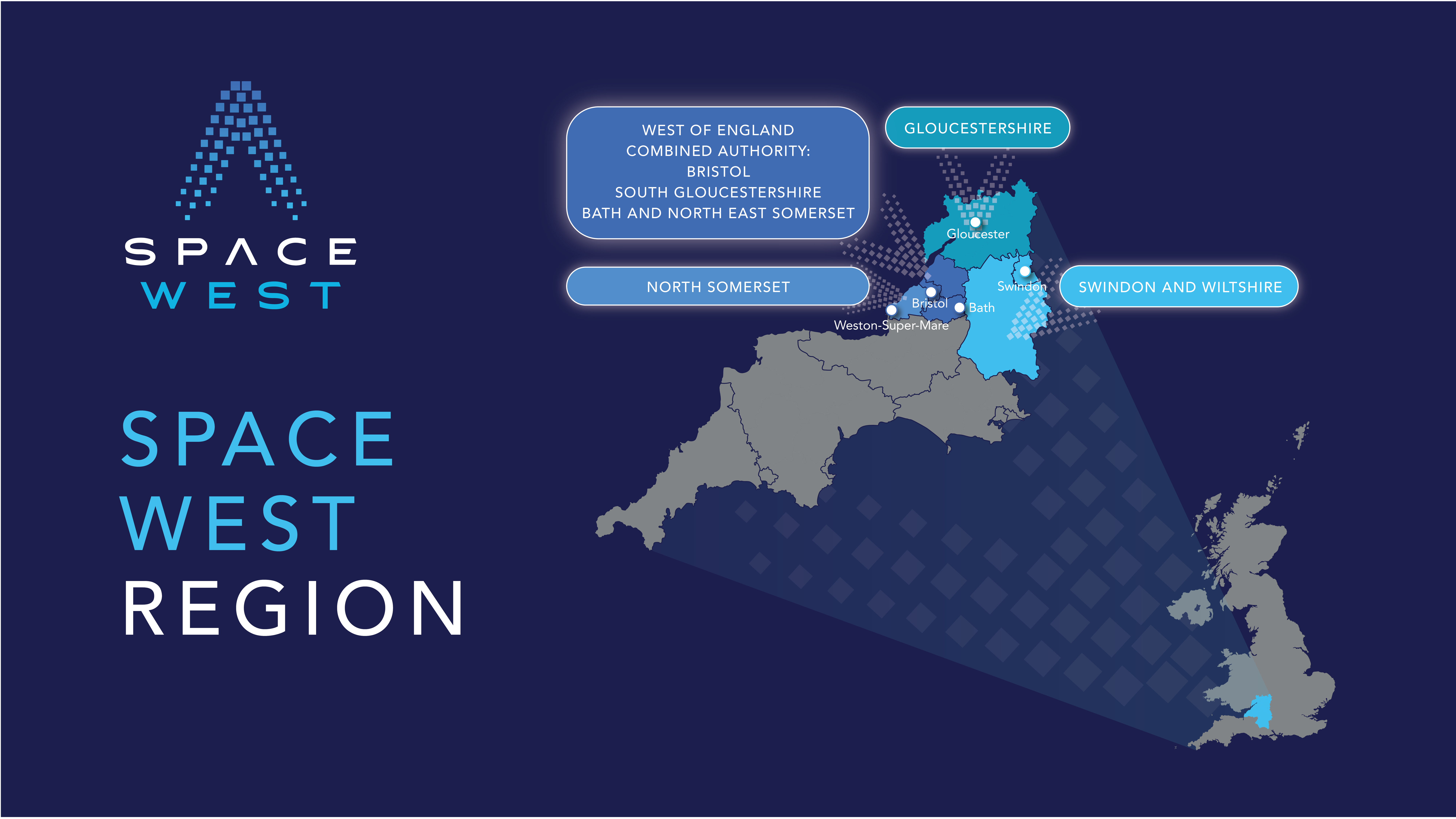
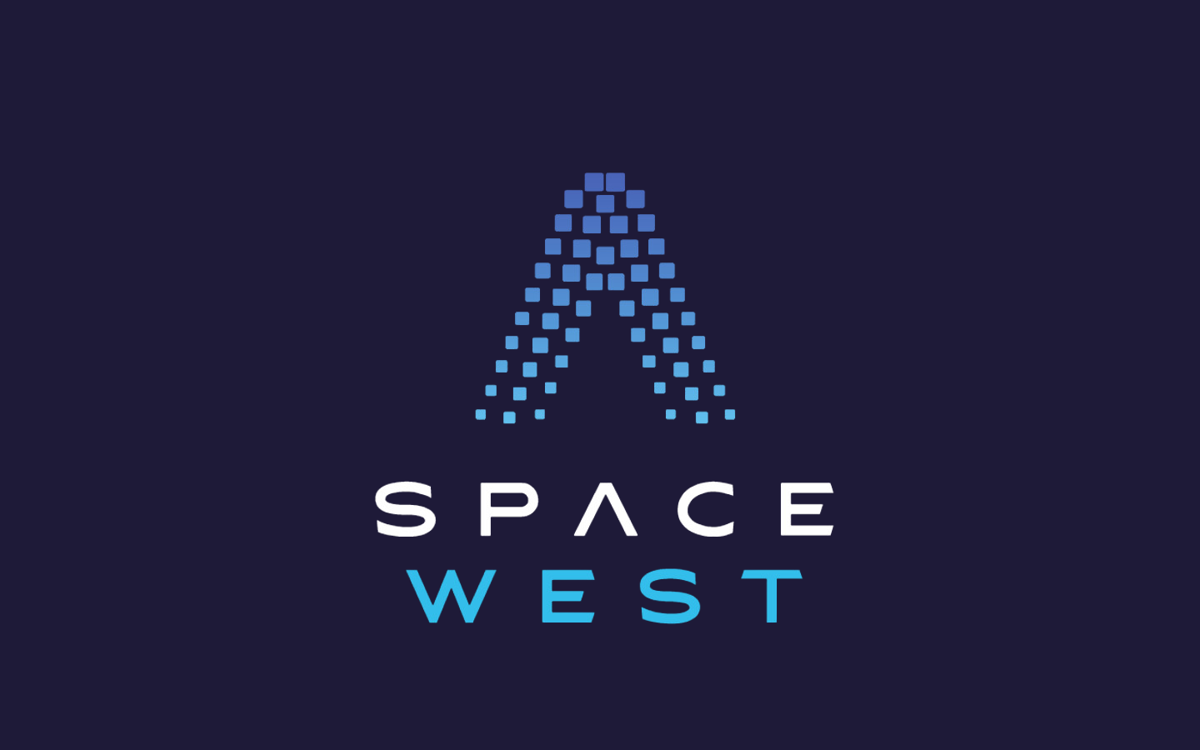
Space West co hosts 'Guardians of the Galaxy Delivering a Cyber-Secure Space' with CyNam
Reflecting on an incredible collaboration at the Cheltenham Science Festival! Rebecca Huffee, Space West, Cluster Manager was delighted to witness the union of the space and cyber sectors at the 'Guardians of the Galaxy Delivering a Cyber-Secure Space' event, co-hosted with CyNam.
Together, we explored strategies to enhance the security and resilience of UK space capabilities. A big thank you to CyNam and all participants for joining us in discussing these critical challenges and exploring new opportunities in the space sector. Let's continue pushing for a safer and more secure future in space.
Check out CyNam's film capturing the event here: https://www.youtube.com/watch?v=mNqrVeppkr8 and express your interest in joining our Space and Cyber Security Working Group below.
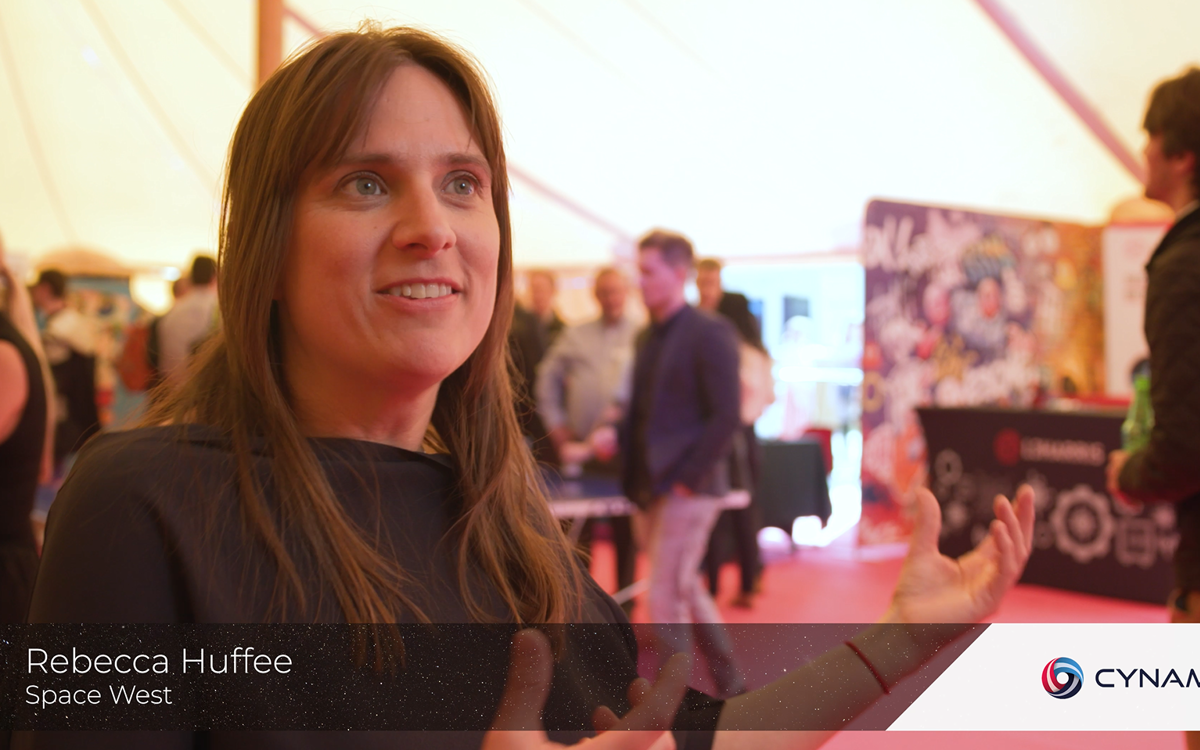
Would you welcome professional and practical learning for you as a sector specialist?
A new Executive development opportunity is now available for Defence and Space sector personnel, with your requirements specifically in mind.
The University of Exeter is pleased to be part of the Global Executive MBA (Defence and Space) (GEMBA) partnership, working alongside the University of South Australia (UniSA) and Carnegie Mellon USA, to deliver an innovative approach to supporting current and future leaders in Global Defence and Space. With sophisticated technological innovation, globalisation and shifting power balances all changing the face of the defence and space industries, the Global Executive Master of Business Administration (Defence and Space), GEMBA, is designed to meet the workforce development needs of these rapidly expanding sectors.
A unique collaboration with international defence and space experts, the 18-month program is delivered across three countries: Australia (Adelaide), the UK (Exeter) and the USA (Pittsburgh/Washington).
You'll undertake intensive in-person residentials in these countries, interspersed with high quality online learning. The in-country experience is immersive, providing access to practitioner experts and creating invaluable networking opportunities with your international peers.
The tailored curriculum features internationally recognised speakers, practitioners and case studies. You'll develop and extend your knowledge and capabilities in relevant fields including space systems, defence procurement, global security and digital disruption, working with stakeholders to gain fresh insights you can apply immediately to your working life and career development.
Applications are now open for the third intake of the Global Executive MBA (Defence and Space), commencing June 2025. Applications for the third intake will close 11:59pm (ACDT) Monday 31 March 2025
Full details about the GEMBA programme can be accessed at:
GEMBA: Defence and Space - Study at UniSA - University of South Australia
UniSA is also proud to offer a number of scholarships specifically for students entering the Global Executive MBA (Defence and Space) program. You may bid for a scholarship once you have made a full application to enter the GEMBA programme.
Global Executive MBA (Defence and Space) scholarship applications for the 2025 intake close at 23:59 ACDT) Monday 24 February 2025. Details about scholarships can be found on the Global Executive MBA (Defence and Space) scholarships page: https://study.unisa.edu.au/mba/mba-partnership-scholarships/gemba-scholarships/
For any general enquiries and questions, you can book a 1:1 conversation appointment on the main GEMBA programme information page. We’re very happy to talk further with you: GEMBA: Defence and Space - Study at UniSA - University of South Australia.
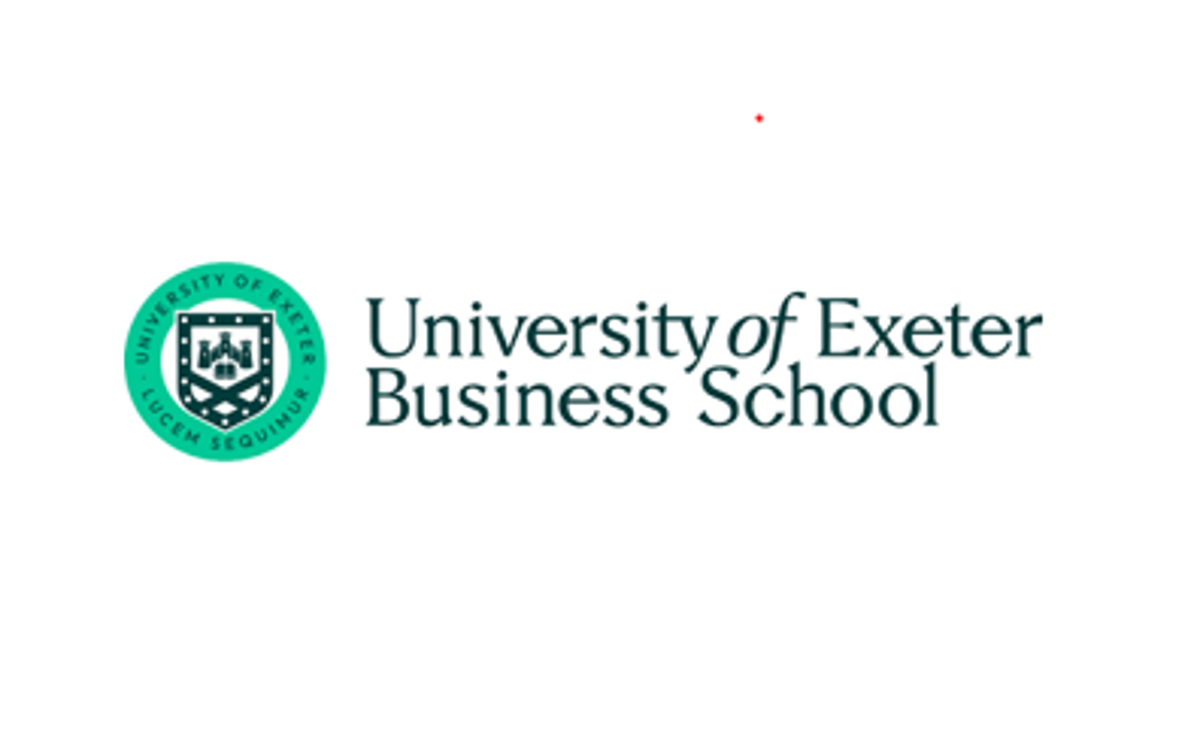
iCOMAT secures $22.5M in funding
Space West are thrilled to see iCOMAT secure $22.5M in funding! This investment will accelerate the automation of composites manufacturing. iCOMAT's innovative fibre-steering technology is poised to revolutionise materials production. Congratulations to the iCOMAT team on this significant achievement!
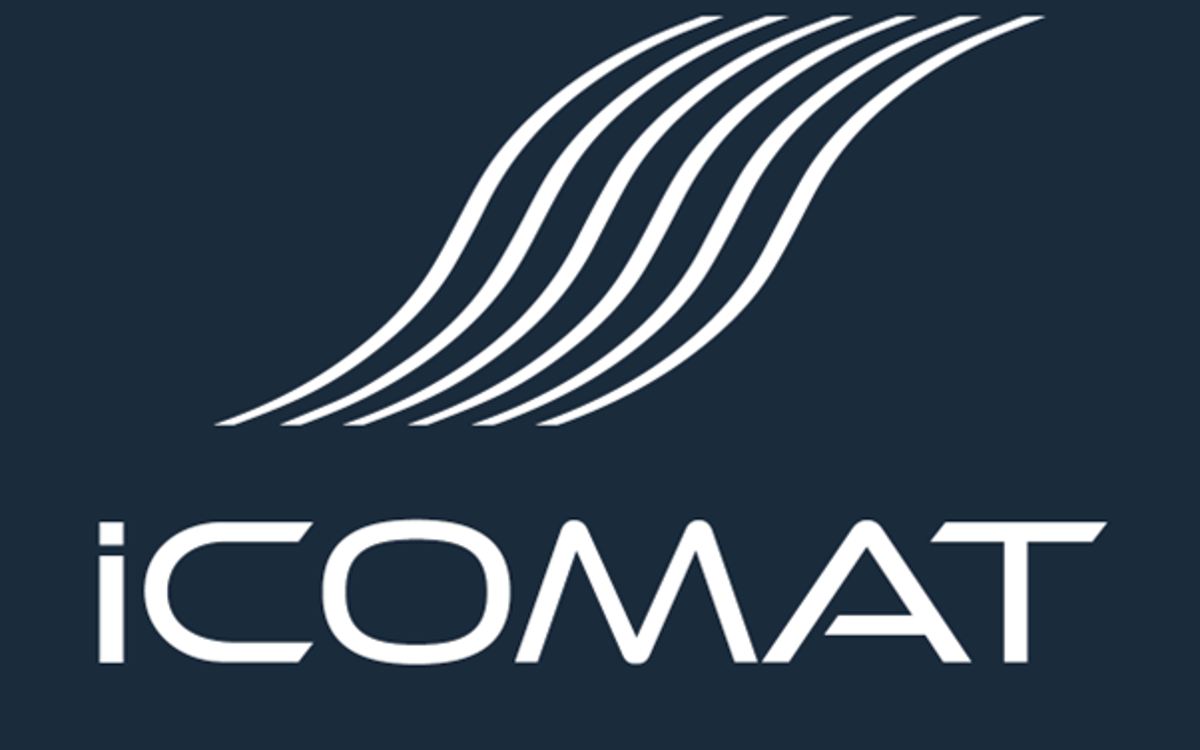
University of Bristol to lead the way in making future digital infrastructures cyber secure
A new University programme which will address the grand challenge of providing cyber security at societal scale has received £6.8 million funding from the Engineering and Physical Sciences Research Council (EPSRC).
The SCULI (Securing Convergent Ultra-large Scale Infrastructures) programme brings together researchers from the Universities of Bristol (lead), Oxford, and Lancaster, who will work with partners across industry, policy and beyond, as well as drawing on their own state-of-the-art lab facilities.
The UK is the third most targeted country in the world for cyber-attacks, after the US and Ukraine, according to the House of Commons inquiry into Cyber Resilience of UK’s Critical National Infrastructure. As our dependence on digital technologies increases, so does the risk of cyber attacks and large scale disruptions to infrastructures on which we rely every day.
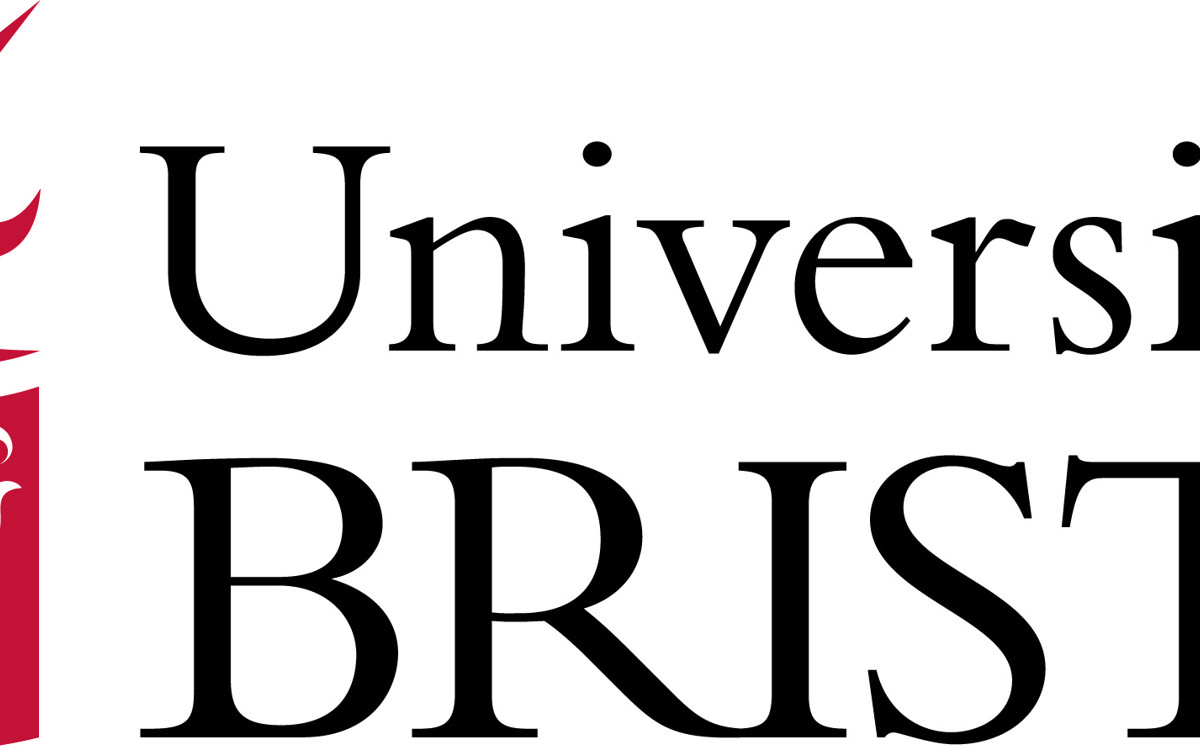
Spotlight on Synoptix
Check out our 'Spotlight' on section to discover stand out companies making waves in the regions space industry. Learn about innovations, achievements, products and contributions to the field.
Synoptix specialise in providing a Systems Engineering capability for organisations, applying both traditional and model-based approaches tailored specifically and pragmatically to meet each client’s specific needs.
We were established in 2011 and have grown to become a medium sized enterprise with c120 people working for us. Most of our work currently sits in the Defence Domain (our customers include BAE Systems, Leonardo, Rolls Royce and the MOD), but we have proven that Systems Engineering is a transferrable skillset – successfully applying it on major programmes across a number of other domains - and are now looking to apply that expertise and the lessons learnt to deliver those same benefits to the Space domain.
Synoptix promotes the digital transformation from traditional document-centric methods to dynamic model-centric approaches, but this must be done pragmatically: no one-size fits all. Adopting a tailored Systems Engineering approach will provide: a simplification of complex systems down to a point of common understanding; a view of system and/or system of systems behaviour; traceability of requirements; the ability to assess change accurately and quickly; and fundamentally optimise the design by linking early phase development with validation, verification, testing and certification activities. Our overall aim at Synoptix is to reduce total programme costs by optimising the design, reducing rework, and delivering on time and cost.
Alongside our core Systems Engineering business we also deliver solutions – developed to meet specific customer needs - in Simulation, Digital Twins, AI, AI Assurance, and Cyber Security. Additionally we have a Technology arm that focus on innovative solutions in computer vision, edge processing, and the application of neural networks (particularly in the areas of validation and trust), all of which are highly relevant to the space industry. Our innovation is supported by close collaboration with academic institutions – currently including KCL, University of Bristol and Loughborough.
To contact Synoptix email Lois Chang at: [email protected]
Synoptix: Space Domain Awareness (SDA) Novel Sensing Case Study
Synoptix undertook research into novel sensing technologies for Space Domain Awareness (SDA) as part of the wider Space Science Project in the Ministry of Defence Science & Technology Programme delivered by Defence Science and Technology Laboratory (DSTL). The emphasis was on Generation-After-Next technologies (GAN); identifying future SDA sensing techniques; improving capability for awareness of adversary space operations; and evidencing how these sensor systems could be exploited.
The Customer's aim was to understand pre-existing and emergent technologies and concepts and how to de-risk their development. Synoptix's application of a systems approach ensured early consideration of the entire system, rather than just individual sensors or components. This holistic view allowed for early identification of integration considerations, enhancing the overall effectiveness of the final operational system.
The work undertaken by Synoptix brought clarity to achieve the primary aim, "Identifying future SDA sensing techniques, to improve capability for gaining awareness of adversary space operations". As well as the secondary aim, "To provide evidence of how identified sensor systems can be exploited".
This is a demonstration of how Synoptix successfully leveraged our well-established Systems Engineering skillset to bring benefit to an application within the Space Domain.

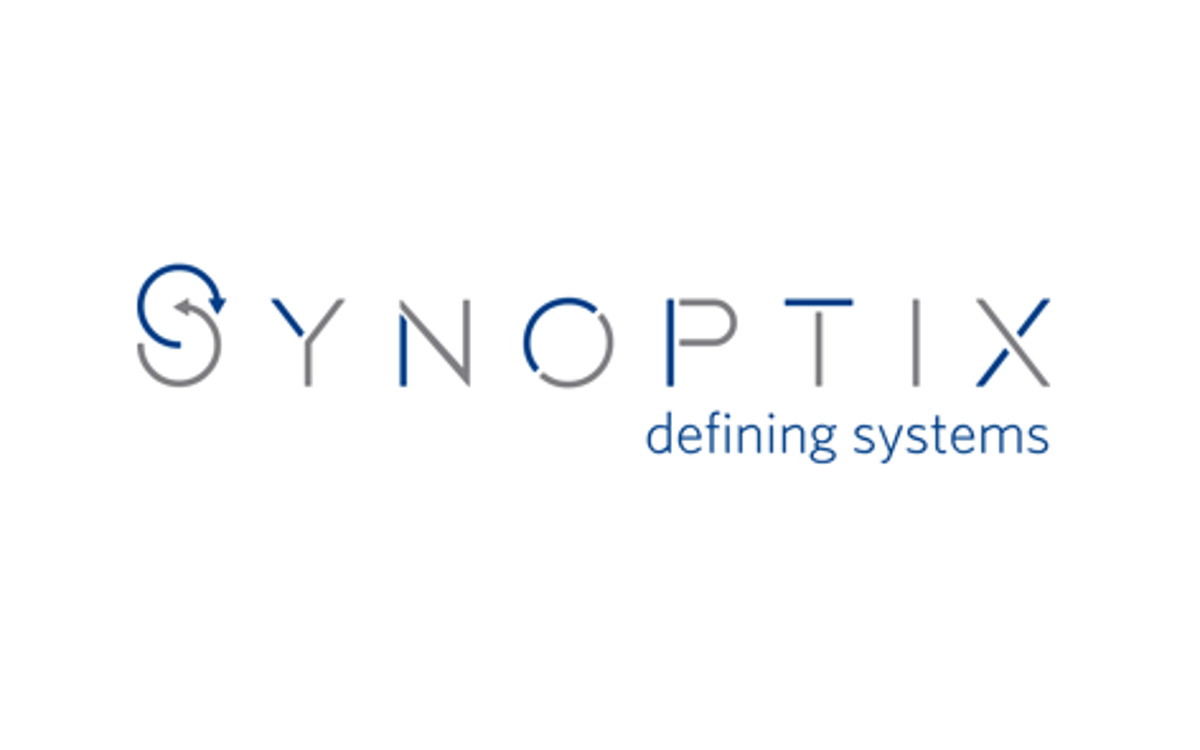
Research in Focus
Explore academic research happening right here in the region. Stay informed about the latest advancements and contributions from our local scientific and engineering community.
Bristol Composites Institute in Space
By Prof. Ian Hamerton, Prof. Byung Chul Kim, & Dr Vincent K. Maes
The high specific properties of composite materials have long made them of interest in space applications, where despite significant reductions over the years it still costs around $15 dollars per gramme of payload to get to Low Earth Orbit (LEO). However, significant challenges remain in terms of producing material systems capable of withstanding the harsh environments, manufacturing light weight components precisely, and developing innovative solutions to enabling future space missions. At the Bristol Composite Institute (BCI), several research activities are targeted at developments that will enable further utilisation of composites in space applications. These can broadly be grouped under three main challenges.
Challenge 1: Getting into Space
While the specific properties of composite materials are high, realising the true potential for lightweighting requires reliable defect free manufacturing as well as significant tailoring of the amount of material and orientation of fibres in different regions of the part. To this end, there have been two key developments at the BCI that promise to contribute to extreme light-weighting. WrapToR, or Wrapped Tow Reinforced, truss structured, led by Dr Ben Woods, combines the high specific properties of composites with the high geometrical efficiency of truss structures and the efficient and highly automatable wrapping process.
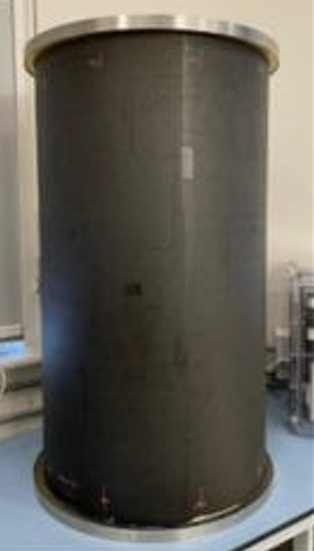
Figure 1 - Manufactured tow steered cylinder designed for improved buckling performance.
In parallel, development of fibre steered composite structures, led by Prof. Byung Chul (Eric) Kim, has had several successful steps towards commercialization. Specifically, a recent academic – industrial collaborative effort, led by the European Space Agency (ESA), which designed and manufactured Rapid Two-Steered (RTS) cylindrical structure, see Figure 1, clearly shows its potential for launch vehicles, where the design focus is not on the strength but on the structural stability during launching. The produced structure was nominated for a JEC Composites Innovation award in 2022. This study, which is now being followed by an ESA-funded project to apply the same methods to a full scale space structure in collaboration with a prime space contractor, was led by Dr Rainer Groh in collaboration with a BCI spin-out company, iCOMAT, which is commercialising Continuous Tow Shearing (CTS) technology after the techniques was first developed within a BCI research project. iCOMAT are proactively engaging with the space industry having secured £4.8M from the UK Space Agency (UKSA) and very recently a further £22.5M Series A from venture capital, a rare feat for composite start-ups.
Looking forward, next-generation automated composites manufacturing technologies are needed to enable highly efficient and complex composite structures that cannot be manufactured with current technologies. At BCI, 3D CTS technologies, see Figure 2, are under development which can manufacture complex space structures such as domes and nose cones without defects (see further reading for publication).
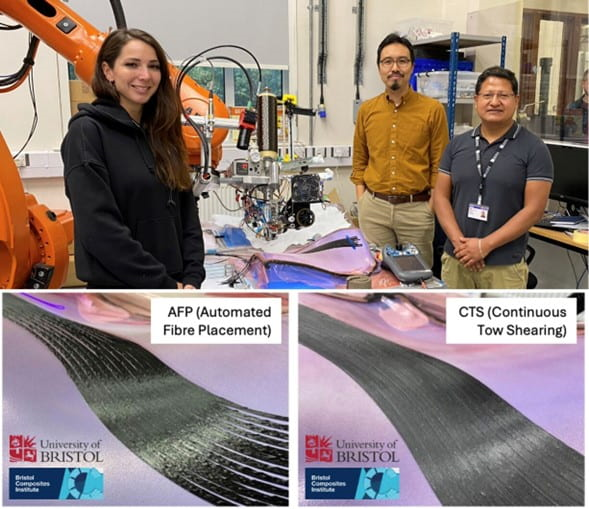
Figure 2 – The team at Bristol developing continuous tow stearing for 3D geometries (top) with examples of standard AFP quality (bottom left) vs CTS quality (bottom right).
To read this article in full and learn more about this work and the challenges involved in developing new material systems and manufacturing process for space applications, click on the button below.

Opportunities
Stay up to date with the latest grants and funding support available in the space industry. Propel your projects and research to new heights!
A new Executive development opportunity is now available for Defence and Space sector personnel, with your requirements specifically in mind.
The University of Exeter is pleased to be part of the Global Executive MBA (Defence and Space) (GEMBA) partnership, working alongside the University of South Australia (UniSA) and Carnegie Mellon USA, to deliver an innovative approach to supporting current and future leaders in Global Defence and Space.

Run by the Defence and Security Accelerator (DASA) aims to inspire companies to win new business, develop industrial capabilities, and provide new cutting-edge answers to defence problems at home and abroad, ensuring the UK expands its competitive, pioneering and world-class defence and security industries. The £16 million programme is designed to support small and medium-sized enterprises (SMEs) across the UK to develop innovative materials, technologies and processes, and to enhance defence supply chains.

A notice of a key ESA Space Solutions theme for 2024: Commercial Applications of Space-Enabled Robotics
This funding is looking to combine some of the breakthroughs in robotics (enhanced autonomy, dexterity, and interaction capabilities) with parallel advancements in the space sector meaning that satellite technologies now have the capability to enable novel services utilising robotics.
There will be 6 sub-theme dates through 2024:
Smart Cities and Infrastructure: 1st March 2024 – 1st May 2024
Transportation and Logistics 1st April 2024 – 1st June 2024
Energy and Utilities: 1st May 2024 – 1st July 2024
Health and Safety: 1st June 2024 – 1st September 2024
Maritime: 1st September 2024 – 1st November 2024
Agriculture: 1st October 2024 – 1st December 2024
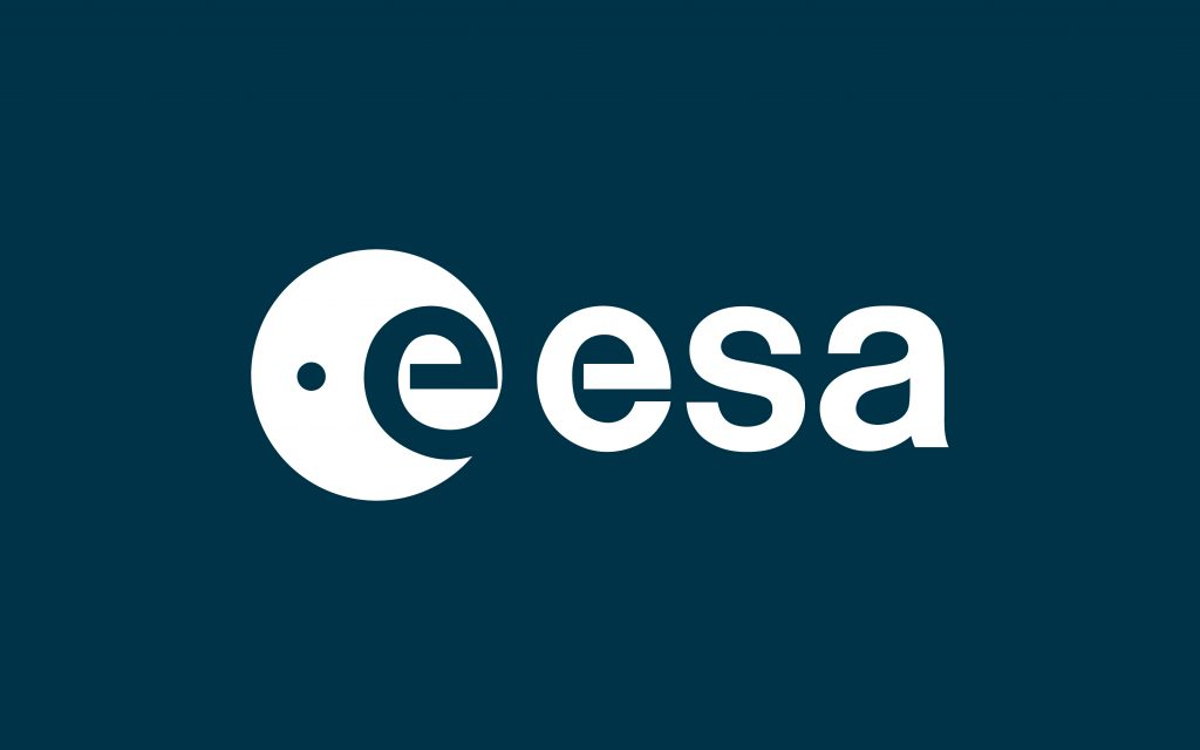
West of England Combined Authority are supporting businesses in the region to explore the benefits from the implementation of digital technologies. Providing access to grant funding, bespoke expertise and guidance for your business as well as skills and training.

The European Space Agency (ESA) is Europe’s gateway to space. Its mission is to shape the development of Europe’s space capability and ensure that investment in space continues to deliver benefits to the citizens of Europe and the world.

The Defence and Security Accelerator find and fund exploitable innovation to support UK defence and security quickly and effectively. Check it out for open calls for funding.

The EO DataHub (EODH) programme has been instigated by UKRI to address challenges around effective exploitation of Earth Observation Data. It represents a first phase of a national asset, supported by the government and specified with the Department of Science, Innovation and Technology (DSIT) alongside NERC. The programme is a pathfinder project led by the National Centre for Earth Observation and a partnership of public sector bodies.
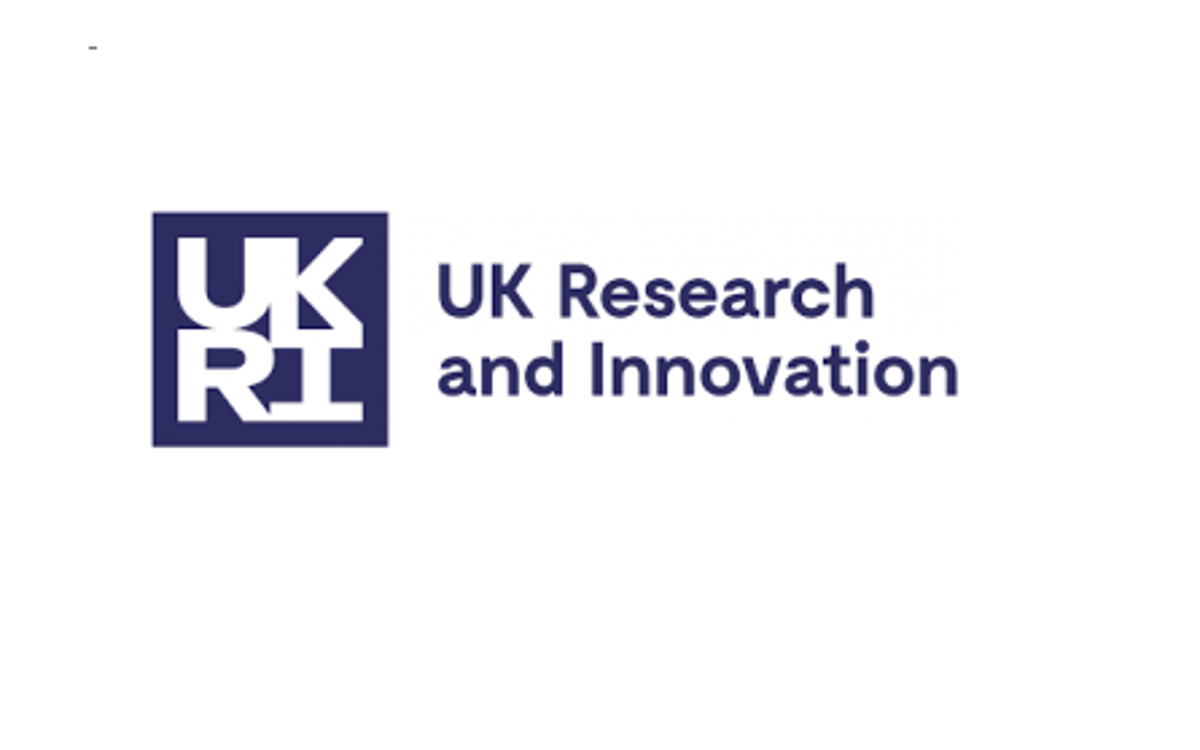
ESA's ARTES Core Competitiveness programme helps European and Canadian industry to develop innovative satcom products, services, systems and partnerships.

The South West Investment Fund is the first in a series of new Nations and Regions Investment Funds being launched by the British Business Bank, and it will deliver a £200 million commitment of new funding to the area. The fund aims to drive sustainable economic growth by supporting innovation and creating local opportunity for new and growing businesses across the South West.

This year, the UK Space Agency is looking to support projects which contribute knowledge relevant to future human and robotic exploration missions.

The purpose of this announcement opportunity is to support academics who have been selected for groups and/or science teams, campaign science groups and other definition work relating to Exploration missions.

Since 2017, the UK has invested €50 million into NavISP to support the UK space PNT sector to innovate the next generation of space-enabled and space-supported navigation products, services and applications.
The UK investment in the programme is available to support UK organisations to undertake technology research and development focused on commercial innovation.

The UK Space Agency is looking to provide support to companies and academic institutions across the UK in developing innovative technologies to grow UK capability. We are keen to engage with start-ups and SMEs (from both within and outside the space sector), as well as established companies and organisations. Collaborative proposals are also welcomed.

Events
Check out our events section to stay informed about upcoming conferences, workshops and networking opportunities in the region. Connect, learn and grow with the best in the field!
Following the success of the Bank of England Breakfast Briefing event held earlier this year, join Business West Chamber, Cirencester Chamber and Cheltenham Chamber to learn what your options are when it comes to securing finance for your business. Kindly sponsored by The Equity Release Partnership, this event is in partnership with the University of Gloucestershire and will be held at the Oxstalls Campus.

This webinar will focus on how Simcenter 3D, HEEDS, and Simcenter Amesim are being utilized in Northrop Grumman’s on-orbit satellite servicing programs to reduce operational risk and predict with a high probability of success the environment in which the robotic systems operate.

Every two years, the aerospace, aviation and defence industries are invited to Farnborough International Exhibition & Conference Centre for the world’s best airshow to pioneer change, build new connections, engage with thought leaders and get access to unparalleled business development opportunities.
Rebecca Huffee, Space West Cluster Manager, will there on behalf of Space West.

Don't miss Defence in Space a two-day free International event tackling a diversity of topics from both the industry & the public sector. Rebecca Huffee, Space West Cluster Manager will be there. Topics include MilSat, Space ISR, Space Domain Awareness, Earth Observation, Geospatial, Multi-orbits, PNT, Satcom, Space Security & Cyber and Defence Strategies. This conference is free of charge and organised by and for the Space & Defence industry.

Defence Space brings together senior UK military and government official, space commanders from international space partners and allies, and leaders in disruptive technologies., including the SME and the start up communities. Defence Space coheres military space strategy and operations with space technology innovation.
Rebecca Huffee, Space West Cluster Manager, will there on behalf of Space West.

Space Tech Expo Europe is Europe’s largest B2B event for the space industry. At the show, you can expect to see a variety of space technologies used in manufacturing processes.
Rebecca Huffee, Space West Cluster Manager, will there on behalf of Space West.
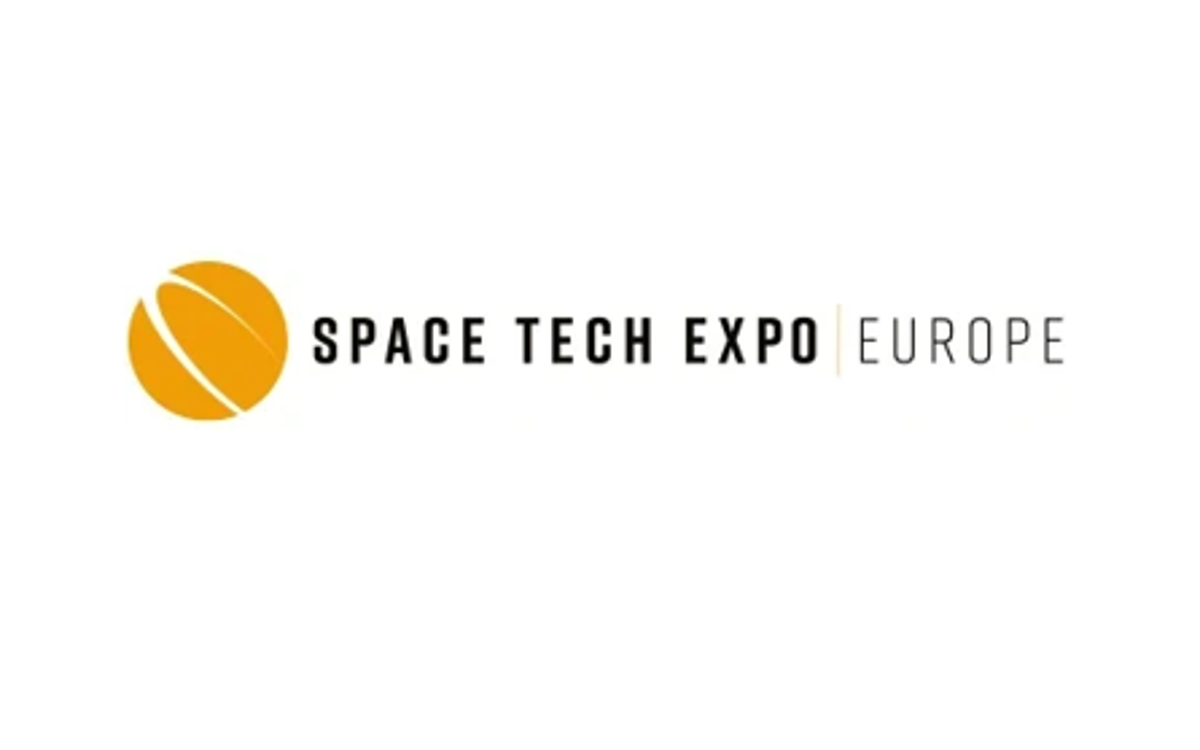
Jobs in the Space West Region
Looking for your next career move in the space industry? Explore our jobs section to find exciting opportunities right here in the region. From engineering roles to business development, your dream job in space awaits!
The role
As a Satellite Communications Engineer you’ll have a role that’s out of the ordinary. Babcock have been awarded the contract to manage and modernise the UK MOD satellite network, Skynet. As part of this programme, we are looking for an experienced Satellite Communications Systems Engineer to lead the upgrade of Radio Frequency (RF) and Intermediate Frequency (IF) Systems.
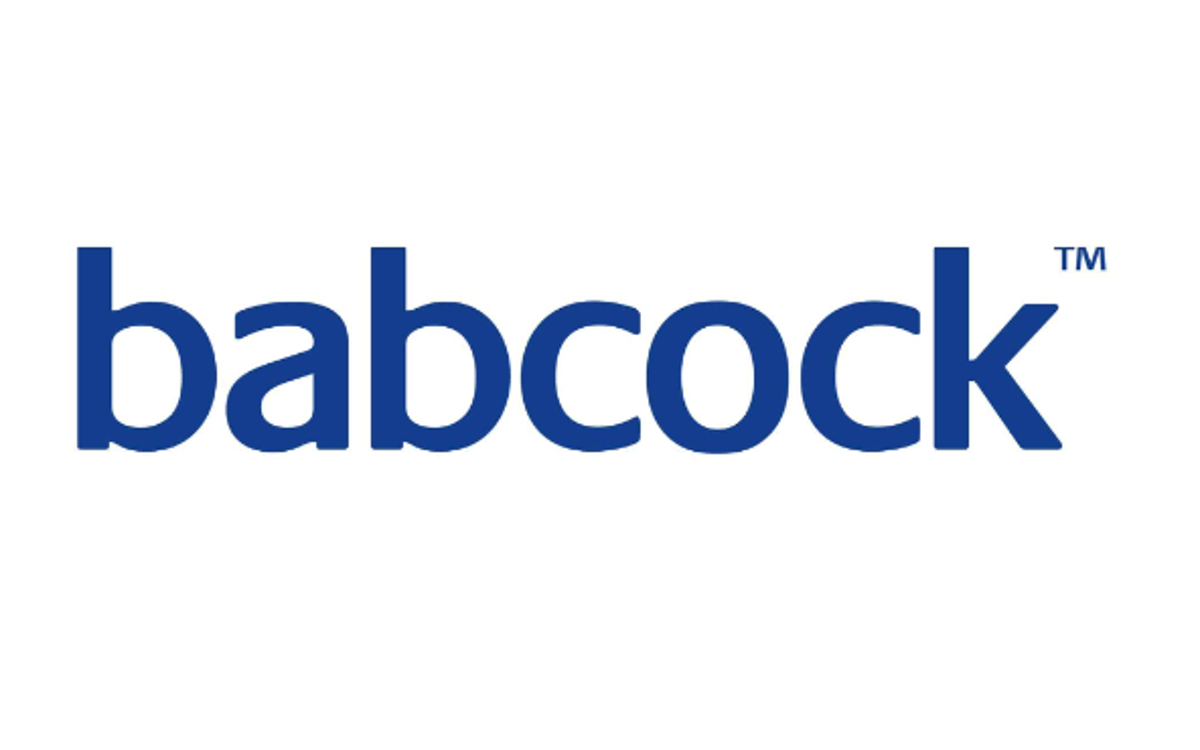
The role
As an Assistant Chief Engineer you’ll have a role that’s out of the ordinary. Mission Systems enable our customers to deliver their mission, through our products and solutions, using intelligence and analysis and delivering critical communication services. Our aim is to be at the centre of our customers' modern digital backbone by connecting and delivering sensors, decision support, and air effectors across military and business domains.

The role
As a Third Line Support Engineer, you’ll have a role that’s out of the ordinary. You will be key in the undertaking of fault investigations and performing upgrades and enhancements. You will also support an On-call rota for out of hours support.

The role
We are looking for a Propulsion System Engineer to join our team in the UK. You will become part of a growing Spacecraft Propulsion and Thermal group. Within this team, you will contribute to the definition and improvement of the Propulsion System designs of Spacecrafts. The activities will range from the specification definition up to the support to AIV activities and will include the execution of tests and technical interactions with suppliers.

The role
D-Orbit is hiring a systems engineer to join our growing UK systems engineering team. As an integral part of the group, you will be involved in both the customization of already flight-qualified platforms, such as the ION Satellite Carrier Vehicle, and the design of new advanced missions. Your ultimate objective as a systems engineer is to ensure your systems, the spacecraft, will fly safely to orbit, deliver the services required by mission objectives and eventually successfully accomplish its disposal.

The role
As a Spaceflight Operation Development Engineer, you will be involved in the design, development, verification, and validation of some of D-Orbit's most innovative space missions. Within this role, you will lead all pre-launch flight operations preparation activities for the missions that you will be assigned to.

The role
D-Orbit is hiring a system engineer to join our growing system engineering team. As an integral part of the group, you will be involved in both the customization of already flight-qualified platforms, such as the ION Satellite Carrier Vehicle, and the design of new advanced missions. Your ultimate objective as a system engineer is to ensure your system, the spacecraft, will fly safely to orbit, deliver the services required by mission objectives and eventually successfully accomplish its disposal.

The role
- Lead the application of iCOMAT's technology in the space domain working with customers and colleagues to create and optimise products for space.
- Act as the design authority for space bids and projects providing advice to colleagues in production and programme management.
- Support the formulation of plans for product and technology development.
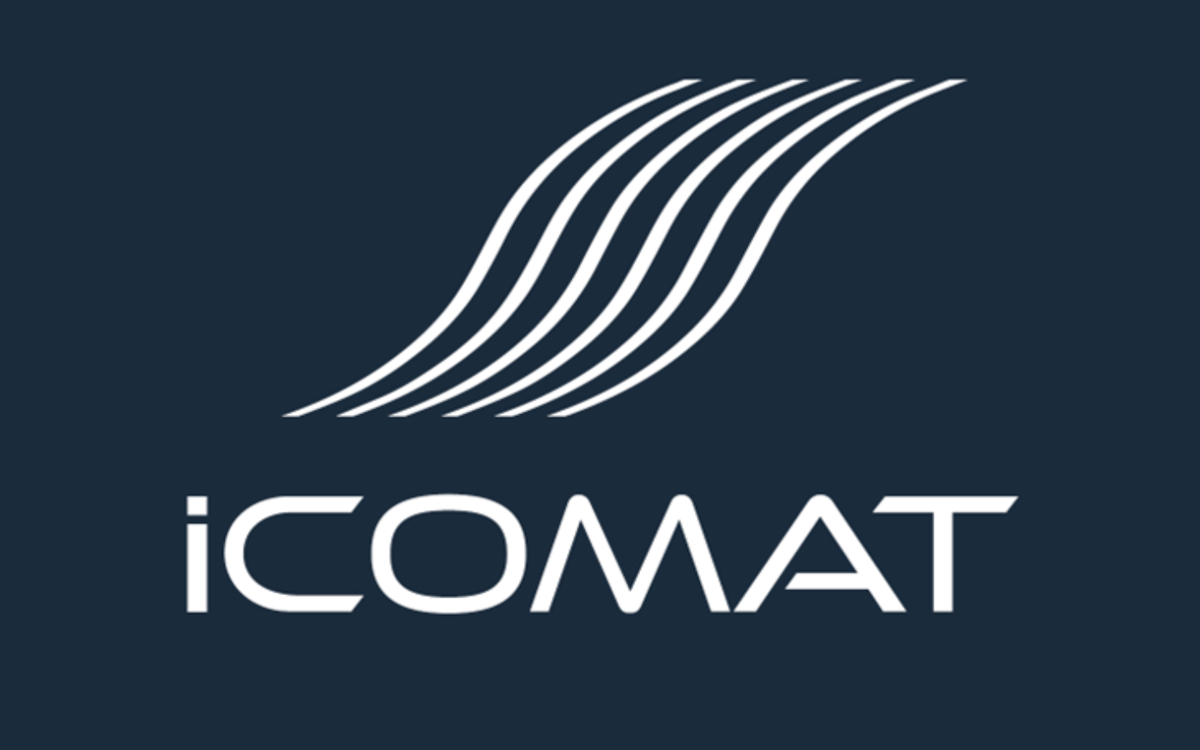
The role
- Lead the development of relationships with customers, partners and other stakeholders in the space sector and the identification of new opportunities for manufacturing sales and collaborative R&D opportunities.
- Develop, manage and deliver a backlog of sales opportunities using a structured, complex selling methodology.
- Provide direction and oversight to bids and the development of current contracts

Starion UK, now headquartered in Bath, is keen to recruit the best expertise to deliver space segment and ground segment systems and studies. Whilst there is not currently a recruitment campaign underway, we welcome CV’s from those seeking roles in these areas. If you are interested, please email [email protected] before the end of June 2024

Space West 2024 Activity Page
Stay connected and witness our exciting endeavors throughout the year. Explore upcoming events, collaborative initiatives, and engaging projects.
